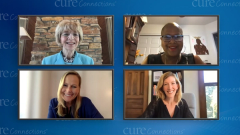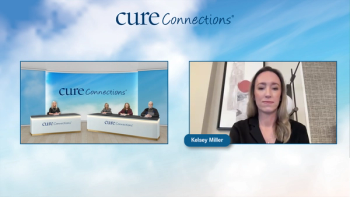
Role of Patient Advocates in Metastatic Breast Cancer
The panel provides closing thoughts on patient advocacy and advocacy activities.
Episodes in this series

These are the experiences and opinions of panelists, not physicians.
Shirley A. Mertz, MA, JD: I just want to give you each a chance to tell us what role - Sheila, I'll ask you and Lisa to tell us, what role do you think advocates provide this whole area of metastatic breast cancer and the future? Lisa, I'll start with you.
Lisa Laudico: Well, advocates were my first lifeline when I was first diagnosed. I entered my first support group probably six weeks after my diagnosis and so the advocates that I met in my support group that was first introduction to advocacy. Again, I mentioned earlier that my support group, they're just a bunch of rock stars, quite frankly. What do they mean and how did they change my trajectory? They instantly gave me a runway of what I could do, what I could choose to do. There's a lot of variety in advocacy. You could start small. You can just join something locally or talk at your local hospital. You can help dispel these myths online if you're more comfortable on social media. There are all kinds of advocacy happening on social media. Sheila mentioned support groups online and Facebook and so forth. There are many different places and in all these forms of advocacy, a lot of its volunteer-run. Most of it is, and so there are little pieces of volunteer opportunities that you can start. I think there are also some great nonprofit organizations that can train you to learn how to speak publicly if you're not comfortable doing that, so you can tell your story. There are places that help with writing your story, there's blogging. It can be going to Capitol Hill, and it can be advocating at the FDA. It can be working as an advocate on clinical trials as a patient like a consumer advocate, a patient living with the disease being evaluated in this trial. And you can be part of that in evaluating it. Sheila does that, she'll talk about that. There's just a wealth of things that you can do. I think it's also important to say that advocacy is also not for everyone. I like to dispel guilt from people. Whatever floats your boat, and if it's going on your boat, if it's going for a walk in the park, if it's being just with your family - that's not even just with your family, that's you living your life. Not everybody with metastatic breast cancer needs to be an advocate, however, it's a great place to funnel that sense of lack of control that you feel when you have this diagnosis. So many of us are not able to do the jobs that we did before and so this provides us where we're using our brains and so it helps with that in terms of our mental health, Advocacy is mental health, it's something I'll say all day long. I just interviewed someone for the pod the other day and she said, "I think it's reduced prison time potentially because I'm a lot nicer with my family." No one's going to kill me and I'm not going to kill anybody else because I have advocacy in my life. I've never heard that described before but I just think that it's something that should be an option for people. But again, no guilt. No one has to do anything. I think that's also important.
Shirley A. Mertz, MA, JD: Thank you. You have given us an overview of different types of advocacies, and I like that you said to people they don't have to be an advocate. If you're loving your family and raising your children, that's what they need.
Lisa Laudico: Yes, busy. We've got a lot to do.
Shirley A. Mertz, MA, JD: We don't have much time, but is there anything that you would like to add about advocacy? I know you're a very active advocate.
Lisa Laudico: Well, Sheila. Yes.
Sheila McGlown: Well, like Lisa was saying, not everybody wants to be an advocate. Some people just want to forget about breast cancer and just leave it alone, and I understand that. But I want them to know that I'm carrying a load for them, I'm their advocate, especially with black women, young women, Latino, white women, it doesn't matter. I'm carrying the load for you. You don't have to be an advocate. You're not alone. Believe me, when I go in to speak, I want people to listen, and I want people to see me.
Shirley A. Mertz, MA, JD: And they do.
Sheila McGlown: Because I mean what I say, and I just hope one day that we can just not even have to talk about breast cancer. But like Lisa said, you do what floats your boat. You do whatever you need to do to get through this disease. There's no right or wrong answer. I always say, "Well, I picked this treatment. Maybe I should have picked the other treatment because maybe that would have lasted." Who knew? Don't ever think that you're doing anything wrong in your breast cancer treatment because you don't know. You have to pick whatever's best for you. As an advocate, I love it. I meet so many people, I get calls and texts and DMs and all kinds of stuff, and it's just a wonderful place that God has placed me in. I always say breast cancer's not about Sheila, it's about who I've helped. And I want God to see that when I get to heaven, like, "Man, you really handled your business down there." I'll be like, "Yes, God. I did."
Shirley A. Mertz, MA, JD: I applaud, Sheila, all your work. When you stand up and talk, people do listen. Lisa, you are just amazing. Today we’ve heard your knowledge base is so broad and wonderful, and I thank you. Julie, do you have anything you would like to say before we close out?
Julie Larson, LCSW: I think I just echo both of them. I would say that my work has taught me a diagnosis of cancer change issue. Full stop. It takes time to figure out how, and if that how includes using your story to move the needle in some way, OK. If that how includes reprioritizing and getting in touch with what matters most to you, fine. But I think that that's your work. You really do believe that. I think that some of the work is figuring out the how. How has it changed you?
Shirley A. Mertz, MA, JD: Wonderful. Well said. I want to just say in closing that I have been for years, a fan of Cure Magazine. I get Cure online in my box when it comes. If you haven't looked at that, you need to, there are wonderful articles that are written by actual patients. Different types of cancers, but they are so eloquent, and they are just so meaningful. You can draw from what they're saying to help you. I just really want to thank Cure Connections for allowing us to do this panel. I hope the viewing audience got something out of it, and if you want to contact any of us, I'm sure you can look us up. I thank you for being with us and I wish you all a very great day. Thank you.
This transcript has been edited for clarity.




